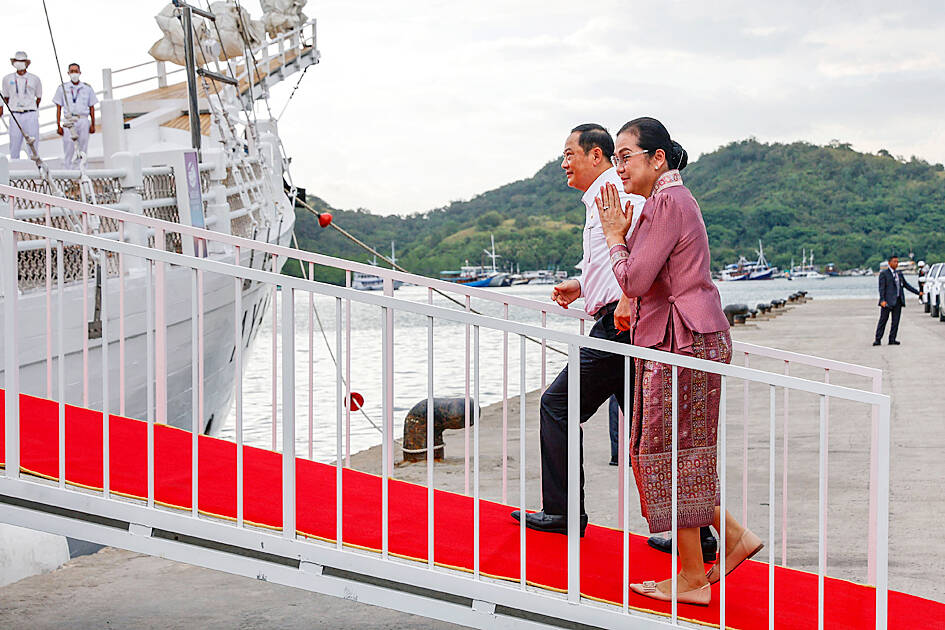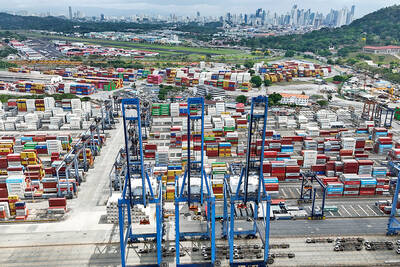An isolated murder, a brutal attempted killing and a murky disappearance: Laotian campaigners have been caught up in a series of incidents that have spooked the reclusive communist state’s embattled dissident community.
Landlocked, poor and deeply tied to China, Laos is one of the world’s most repressive countries, with independent civil society barely present, free media non-existent and rare demonstrations quickly dispersed.
A spate of incidents involving government critics has sparked fears of a crackdown as the country prepares to take the ASEAN chair next year.

Photo: AFP
The latest wave of incidents began at the end of April when a gunman shot campaigner Anousa “Jack” Luangsuphom in the head and body in a brazen attack at a cafe in the capital, Vientiane.
The 25-year-old was an admin for a popular Facebook page in which users shared memes, jokes and their dissatisfaction with the government.
“They were very scared when they saw what happened,” exiled Laotian dissident Joseph Akaravong said of the campaigning community.
“It shows that the Lao government is afraid to see people activating to demand rights and freedoms in Laos,” he said from France, where he was granted asylum last year.
Last year, Anousa received an anonymous death threat and a warning to leave the country, one person with knowledge of the events said on condition of anonymity, citing fears for their safety, or that the Laotian government would ban them from working in the country.
In the days after Anousa’s shooting, Lao’s state news agency published shocking, graphic video footage of the attack.
Miraculously, he survived, but his family initially said he was dead to deter the gunman from returning to finish him off, and he is now being treated abroad.
Less than two weeks later, campaigner Savang Phaleuth was taken into police custody on May 9 after returning to Laos from Thailand, where he had been living and working for 16 years.
Rights groups said the police had not informed Savang’s family of the charges against him or allowed them to visit.
On May 16, Bounsuan Kitiyano was found dead in Thailand’s Ubon Ratchathani Province on the Laotian border, shot three times and dumped in a forest.
Savang and Bounsuan were part of the Free Lao group, which advocates for democracy and has staged demonstrations outside the country’s Bangkok embassy.
There is no proven link between the Laotian government and either attack, and investigators in Anousa’s shooting and Bounsuan’s killing have suggested personal disputes could be to blame.
However, rights groups said that the three incidents fit a disturbing and long-term pattern of harm coming to those who criticize or resist the regime.
“It is very clear that there is an ongoing effort to wipe out Laos critics and activists in Thailand,” International Federation for Human Rights Asia Desk director Andrea Giorgetta said.
This repression has been going on for years, he said, citing the environmental campaigner Sombath Somphone, who vanished in 2012.
However, a change seems to be underway, he said.
“There is definitely an escalation of measures that are being used to target dissidents,” he said. “From detentions and deportations, you see outright killings.”
Ten human rights organizations — including Amnesty International and Human Rights Watch — issued a joint statement urging Bangkok and Vientiane to investigate Bounsuan’s killing, referring to “a recurring targeting of human rights defenders affiliated with Free Lao.”
Other Free Lao members targeted include Od Sayavong and his housemate, who vanished in 2019, as well as Somphone Phimmasone, Soukane Chaithad and Lodkham Thammavong — all arrested in 2016.
“Under this repressive climate, these human rights defenders who fled their country continue to live in fear of being targeted for exercising their human rights,” the statement said.
The Laotian Ministry of Foreign Affairs and its embassy in Bangkok did not respond to requests for comment
Laos is to lead ASEAN next year, and some observers have said that Vientiane could be trying to clean house before the country takes the international spotlight.
“Lao authorities may be trying to get rid of activists ahead of being under high scrutiny next year,” human rights group Manushya Foundation director Emilie Pradichit said.
Others have pointed to Laotian Prime Minister Sonexay Siphandone, who pledged in December last year to tackle economic issues and “raise the spirit of the revolution to the highest level.”
“The increased violence against Lao activists is to suppress any dissenting voice that would undermine the new prime minister’s authority and image,” Pradchit said.

THE TRAGEDY OF PUNCH: Footage of the seven-month-old Japanese macaque has gone viral online after he was rejected by his mother and formed a bond with a soft toy A baby monkey in Japan has captured hearts around the world after videos of him being bullied by other monkeys and rejected by his mother went viral last week. Punch, a Japanese macaque, was born in July last year at Ichikawa City Zoo. He has drawn international attention after zookeepers gave him a stuffed orangutan toy after he was abandoned by his mother. Without maternal guidance to help him integrate, Punch has turned to the toy for comfort. He has been filmed multiple times being dragged and chased by older Japanese macaques inside the enclosure. Early clips showed him wandering alone with

South Korea would soon no longer be one of the few countries where Google Maps does not work properly, after its security-conscious government reversed a two-decade stance to approve the export of high-precision map data to overseas servers. The approval was made “on the condition that strict security requirements are met,” the South Korean Ministry of Land, Infrastructure and Transport said. Those conditions include blurring military and other sensitive security-related facilities, as well as restricting longitude and latitude coordinates for South Korean territory on products such as Google Maps and Google Earth, it said. The decision is expected to hurt Naver and Kakao

Australian Prime Minister Anthony Albanese yesterday said he did not take his security for granted, after he was evacuated from his residence for several hours following a bomb threat sent to a Chinese dance group. Albanese was evacuated from his Canberra residence late on Tuesday following the threat, and returned a few hours later after nothing suspicious was found. The bomb scare was among several e-mails threatening Albanese sent to a representative of Shen Yun, a classical Chinese dance troupe banned in China that is due to perform in Australia this month, a spokesperson for the group said in a statement. The e-mail

‘OCCUPATION’: Hong Kong said it had lodged ‘stern protests’ with Panama’s consulate, and would ‘staunchly support’ the rights and interests of Hong Kong companies Panamanian President Jose Raul Mulino on Monday ordered the temporary occupation of two ports run by a unit of CK Hutchison Holdings Ltd following the Supreme Court’s ruling against the firm’s concession, escalating a dispute that has become a proxy battle between the US and China in Latin America. Mulino said in a speech that the administration and operation of the two ports on the strategic Panama Canal is to revert to the country’s National Maritime Authority to ensure their uninterrupted, safe and efficient operation. The occupation covers movable equipment at the ports and does not mean a definitive loss of